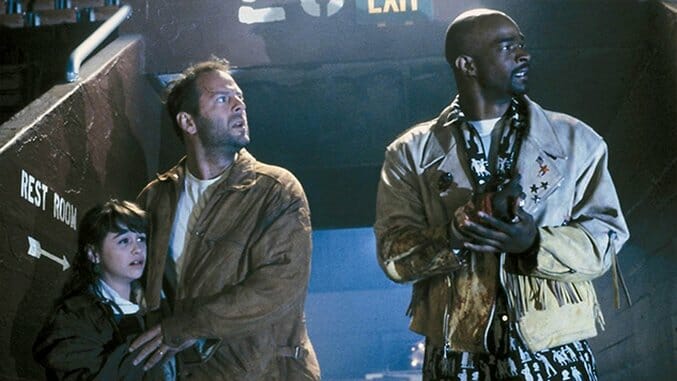From Boys to Guys: Shane Black’s Same Story
Few critics refer to the Black-written The Last Boy Scout as a spiritual precursor to The Nice Guys. Kenji Fujishima discusses why that's a mistake.

When it comes to discussing The Nice Guys, the latest detective action comedy from Shane Black, most film critics have cited not only Black’s previous effort as both a writer and director, Kiss Kiss Bang Bang (2005), as a reference point, but also 1970s Los Angeles-set neo-noirs like The Long Goodbye (1973) and Chinatown (1974). It’s easy to see why: not just in the fact that Black sets his new film in the 1970s (bell bottoms, Ryan Gosling’s thick mustache and all), but in its combining the pessimistic worldview of those aforementioned genre touchstones with Black’s wise-guy dialogue.
Less widely cited, though, is a previous Shane Black film that is, in many ways, The Nice Guys’s spiritual predecessor: the Black-scripted Tony Scott film from 1991, The Last Boy Scout. Though the time period and plot details differ, the similarities between the two films are remarkable, suggesting an attempt on Black’s part with his more recent film to revisit a milieu he explored 15 years earlier, possibly to see if his own perspective has changed in the meantime.
Consider:
1. Two washed-up men are forced to team up to solve a crime.
In The Last Boy Scout, both Joe Hallenbeck (Bruce Willis) and Jimmy Dix (Damon Wayans) are disgraced professionals: Hallenbeck a former Secret Service agent who is now barely scraping by as a detective after he was fired from his service detail protecting Sen. Calvin Baynard (Chelcie Ross); Dix a former football quarterback currently banned from the sport on gambling and drug-abuse charges. Both are unwillingly drawn together when people close to them are murdered in what they gradually uncover is a conspiracy on the part of a Los Angeles football team owner, Sheldon “Shelley” Marcone (Noble Willingham), to legalize professional gambling by assassinating the corrupt Baynard. Naturally, a whole lot of buddy-cop-style locker-room banter ensues as they begrudgingly ally against dastardly forces.
In The Nice Guys, the particulars of the circumstances that bring private eye Holland March (Ryan Gosling) and bodyguard Jackson Healy (Russell Crowe) together may be drastically different: Instead of pro football, the porn industry is the film’s arena, with the auto industry and a group of counterculture radicals eventually thrown into the conspiratorial mix. Still, the characters are similarly troubled both professionally and personally. March is haunted by a tragedy—the death of his wife—that was the direct result of his lack of a sense of smell. Meanwhile Healy, for all his toughness, is wracked with self-loathing at the direction his life has taken, a lone heroic incident at a diner standing as the one time he felt “useful.” Self-loathing is also the quiet fuel for Hallenbeck and Dix’s stream of cynical one-liners in The Last Boy Scout.
2. A daughter willingly throws herself into danger.
Hallenbeck’s daughter, Darian (Danielle Harris), may hate her father’s guts—as her first scene with him, in which she calls him, among other epithets, an “asshole” and a “fuck-up,” vividly demonstrates—but, like her father, she has something of a perverse taste for danger, which is why she ends up hiding in Dix’s car and following him right into the center of a life-threatening debacle. Same with March’s daughter, Holly (Angourie Rice), who finds herself at a porn producer’s house party in essentially the same way, by hiding out in a car until his father and Healy find her in the trunk.
-

-

-

-

-

-

-

-

-

-

-

-

-

-

-

-

-

-

-

-

-

-

-

-

-

-

-

-

-

-

-

-

-

-

-

-

-

-

-

-








































